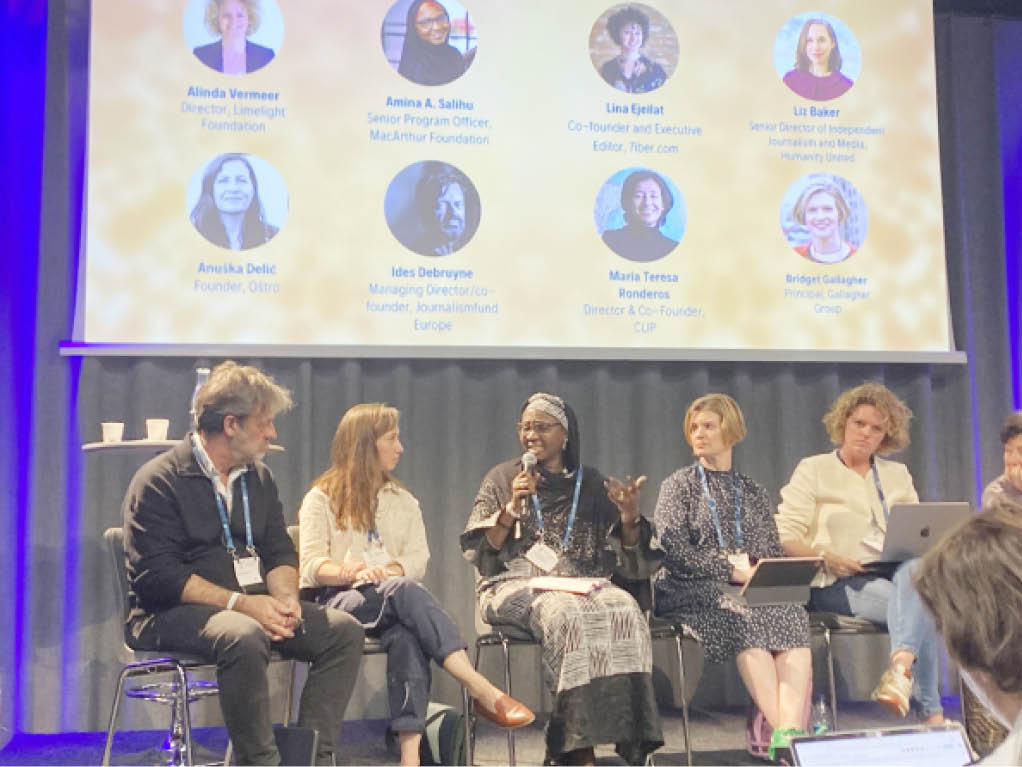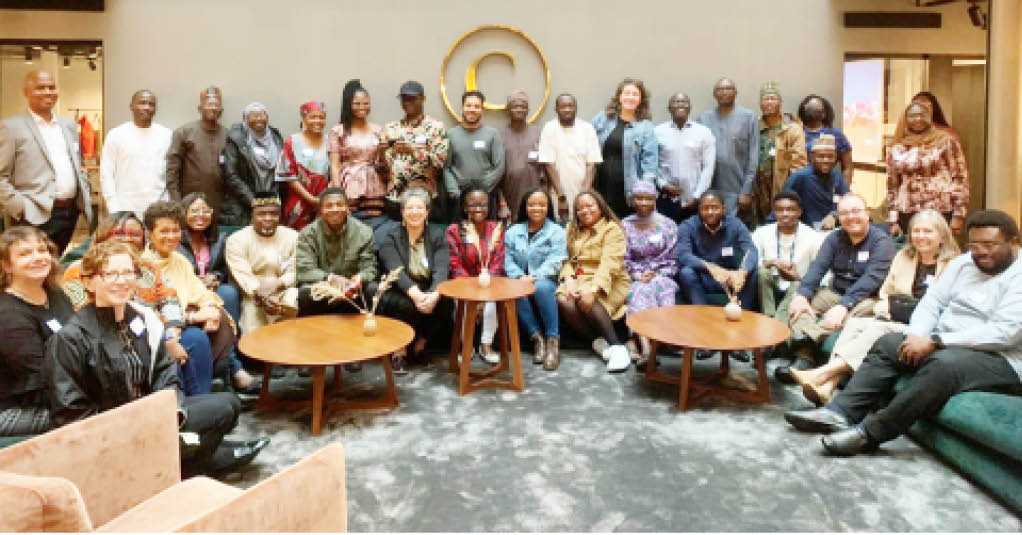“You cannot put this genie back in the bottle,” was the firm message, David Kaplan, whose tenure just ended as the Executive Director of the Global Investigative Journalism Network (GIJN), sent to world autocrats and enemies of press freedom all over the world.
“We are not going anywhere, we are growing, we are getting bigger not smaller,” Kaplan said, referring to the critical role that investigative journalists play all over the world. He stressed that journalists are embracing technology, data, Artificial Intelligence and other tools at their disposal to do watchdog journalism even better.
Kaplan spoke at the official convening of the 2023 Global Investigative Journalism Conference (GIJC) at the Svenska Mässan conference centre in Gothenburg, Sweden, last week, where the world’s largest gathering of investigative journalists converged.
It was the 13th conference since the first gathering in Copenhagen in 2001 and this year marked a record number of over 2,100 journalists from over 130 countries, including Nigeria.
Since it started a little over a decade ago, the GIJC has brought together more than 10,000 journalists from 140 countries, according to the Global Investigative Journalism Network; an association of over 200 organisations in 90 countries, dedicated to spreading and advancing investigative journalism around the world.
Moving from Copenhagen to Amsterdam, Toronto, Lillehammer, Geneva and Kyiv, the GIJ conference had in the last decade also converged journalists in Rio de Janeiro, Johannesburg, Hamburg and lastly, the historic city of Gothenburg. All gatherings for the biennial conferences had been in-person, except for 2021, due to the global effect of Covid-19.

Since then, so much has happened after a pandemic that claimed more than six million people around the world, forced a lockdown and a new order of restrictions in travel, social gatherings and even consumption patterns. The pandemic had also enforced a switch to a world of virtual work, and in many cases, accelerated the use and how journalists have embraced AI. This also dominated the GIJC’s pre-conference conversations at the Lindholmen Science Park, in Gothenburg.
Several discussions at the pre-conference centred around AI powered tools and how they can save small newsrooms, as well as what AI has to do with investigative journalism and its perils and promise. One thing quickly became common in these conversations. That collaborations in the media industry must go beyond media organisations working together to treat and publish stories. Instead, collaborations in the real sense, are now expanding and crossing disciplines, geographies as well as topics.
To do this, journalists must now work with experts from other fields, not necessarily as sources, but as collaborators to come up with innovative tools that will make investigative journalism better and less cumbersome.
It soon became clear that to compete favourably in the face of a growing shrinkage of newsrooms, Nigeria’s media outfits must begin to collaborate with computer scientists and other experts to come up with in-house AI tools to help in gathering stories, or at better still, alert them on story sources.
But AI, as scary or ambitious as it may sound, is not the only challenge facing investigative journalists. Kaplan made it clear that the world is not as it should or used to be. After 11 years at the helm of GIJN and 45 years working experience in investigative journalism, he said he was now more alarmed than ever, at the rising tensions and attacks on freedom of speech. “Even in places where we thought we were reasonably secured, but particularly, with creeping autocracy and the backlash against civil society and democracy, independent media is the first thing that these guys go after and we are in trouble.”
He however has one simple piece of advice for every journalist on the planet. “Just fight everything they are throwing at us, slap suites, denial of licenses and prosecution and murder, just fight. They can’t seem to stop what has become a global movement of investigative journalism,” he said.
Coming home to Nigeria, journalists continue to face threats and harassment, from government establishments in the discharge of their duties. In the last general election in February, alone, at least 28 journalists, including Dayo Aiyetan, the founder of the International Centre for Investigative Reporting (ICIR) were harassed and molested. Not to mention the many slap suites and fines broadcast stations continue to face.
But the press, even in Nigeria, continue to contend with relentless assaults by spywares targeting media organisations, journalists and their relations. A harrowing reality check on the pervasiveness of this digital threat was made clear by GIJC keynote speaker, Ron Deibert, who is also the director of Citizen Lab at the University of Toronto.
He urged reporters to work together in collaboration to fight back, by investigating the hacking industry that is targeting them and, in most cases, their relatives.
The main event of the GIJC was packed-full and had a total of almost 200 sessions with expert panels, sessions on academic research and most importantly, high powered networking for journalists all over the world.
Sessions from the academic sector tracked researches on challenges for investigative journalists in Africa, research on investigations adapting to new technologies, research on cross-border collaborations and hybrid journalism as well as academic research on challenges to women in investigative journalism, among others.
Thanks to the MacArthur Foundation, which sponsored the scholarship of about 40 Nigerians, myself included, GIJC offered an inspiring week of learning, meeting new faces and most importantly, a charge to push through the challenging, but fulfilling cause of watchdog and accountability journalism.
Even at that, getting around the GIJC sessions was no tea-party as some of the rooms were very small and could accommodate only a few people. The organisers had made this clear from the inception with a caveat that seats will be available on a first-come, first-serve basis. But with so many interesting sessions taking place at the same time, all many could do was to either run through the day’s sessions and sample specific ones to attend, or move from one room to the next with the hope of getting a little bit of everything.
Away from the conference, the Nigerian team stayed back an extra day in Gothenburg to attend a convening with MacArthur Foundation where ideas on media sustainability were shared. The convening also showcased the different approaches in generating revenue and establishing new business models for Nigeria’s media organisations.
Again, it was reiterated that collaborations should go beyond media organisations working together but include experts within the academic sector.
This was made clear by the Executive Director, Digital and Editorial of Media Trust Group, Naziru Mikail, who said the media industry in Nigeria need to talk to each other and beyond each other, to come up with innovative ways of sustaining the industry.
“We need to talk to each other, we need to work with each other, beyond publishing stories. We also need to work with those in the academic sector to come up with how best to sustain the practice,” he said.

 Join Daily Trust WhatsApp Community For Quick Access To News and Happenings Around You.
Join Daily Trust WhatsApp Community For Quick Access To News and Happenings Around You.


